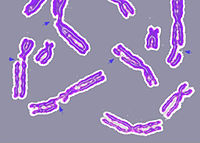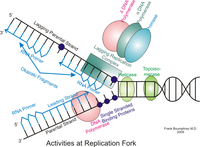
The role of double‐strand break repair, translesion synthesis, and interstrand crosslinks in colorectal cancer progression—clinicopathological data and survival
Sign Up to like & getrecommendations! Published in 2019 at "Journal of Surgical Oncology"
DOI: 10.1002/jso.25737
Abstract: DNA repair is a new and important pathway that explains colorectal carcinogenesis. This study will evaluate the prognostic value of molecular modulation of double‐strand break repair (XRCC2 and XRCC5); DNA damage tolerance/translesion synthesis (POLH, POLK,… read more here.
Keywords: break repair; colorectal cancer; translesion synthesis; strand break ... See more keywords

Molecular Insights into the Translesion Synthesis of Benzyl-Guanine from Molecular Dynamics Simulations: Structural Evidence of Mutagenic and Nonmutagenic Replication.
Sign Up to like & getrecommendations! Published in 2017 at "Biochemistry"
DOI: 10.1021/acs.biochem.6b01247
Abstract: DNA can be damaged by many compounds in our environment, and the resulting damaged DNA is commonly replicated by translesion synthesis (TLS) polymerases. Because the mechanism and efficiency of TLS are affected by the type… read more here.
Keywords: molecular dynamics; dna; translesion synthesis; replication ... See more keywords

Translesion synthesis inhibitors as a new class of cancer chemotherapeutics
Sign Up to like & getrecommendations! Published in 2020 at "Expert Opinion on Investigational Drugs"
DOI: 10.1080/13543784.2021.1850692
Abstract: ABSTRACT Introduction: Translesion synthesis (TLS) is a DNA damage tolerance mechanism that replaces the replicative DNA polymerase with a specialized, low-fidelity TLS DNA polymerase that can copy past DNA lesions during active replication. Recent studies… read more here.
Keywords: cancer chemotherapeutics; new class; dna; translesion synthesis ... See more keywords

Targeting translesion synthesis (TLS) to expose replication gaps, a unique cancer vulnerability
Sign Up to like & getrecommendations! Published in 2021 at "Expert Opinion on Therapeutic Targets"
DOI: 10.1080/14728222.2021.1864321
Abstract: ABSTRACT Introduction: Translesion synthesis (TLS) is a DNA damage tolerance (DDT) mechanism that employs error-prone polymerases to bypass replication blocking DNA lesions, contributing to a gain in mutagenesis and chemo-resistance. However, recent findings illustrate an… read more here.
Keywords: tls; translesion synthesis; synthesis tls; cancer ... See more keywords

Ribonucleotide incorporation by human DNA polymerase η impacts translesion synthesis and RNase H2 activity
Sign Up to like & getrecommendations! Published in 2017 at "Nucleic Acids Research"
DOI: 10.1093/nar/gkw1275
Abstract: Abstract Ribonucleotides (rNs) incorporated in the genome by DNA polymerases (Pols) are removed by RNase H2. Cytidine and guanosine preferentially accumulate over the other rNs. Here we show that human Pol η can incorporate cytidine… read more here.
Keywords: dna; rnase; translesion synthesis; incorporation ... See more keywords

The C-terminal region of translesion synthesis DNA polymerase η is partially unstructured and has high conformational flexibility
Sign Up to like & getrecommendations! Published in 2018 at "Nucleic Acids Research"
DOI: 10.1093/nar/gky031
Abstract: Abstract Eukaryotic DNA polymerase η catalyzes translesion synthesis of thymine dimers and 8-oxoguanines. It is comprised of a polymerase domain and a C-terminal region, both of which are required for its biological function. The C-terminal… read more here.
Keywords: terminal region; polymerase; translesion synthesis; region ... See more keywords

A Well-Conserved Archaeal B-Family Polymerase Functions as an Extender in Translesion Synthesis
Sign Up to like & getrecommendations! Published in 2022 at "mBio"
DOI: 10.1128/mbio.02659-21
Abstract: In this work, we report that Sulfolobus islandicus Dpo2, a B-family DNA polymerase once predicted to be an inactive form, is a bona fide DNA polymerase functioning in translesion synthesis. S. islandicus Dpo2 is a… read more here.
Keywords: dna; translesion synthesis; dna polymerase; polymerase ... See more keywords

High Risk α-HPV E6 Impairs Translesion Synthesis by Blocking POLη Induction
Sign Up to like & getrecommendations! Published in 2020 at "Cancers"
DOI: 10.3390/cancers13010028
Abstract: Simple Summary Cervical cancers (CaCx) are caused by the expression of human papillomavirus oncogenes (HPV E6 and E7). Here, in vitro assays, computational approaches and immunohistochemical analysis of cervical biopsies show that HPV oncogenes impair… read more here.
Keywords: replication; tls; translesion synthesis; replication stress ... See more keywords

Recent Advances in Understanding the Structures of Translesion Synthesis DNA Polymerases
Sign Up to like & getrecommendations! Published in 2022 at "Genes"
DOI: 10.3390/genes13050915
Abstract: DNA damage in the template strand causes replication forks to stall because replicative DNA polymerases are unable to efficiently incorporate nucleotides opposite template DNA lesions. To overcome these replication blocks, cells are equipped with multiple… read more here.
Keywords: dna; synthesis polymerases; understanding structures; dna polymerases ... See more keywords

Translesion Synthesis: Insights into the Selection and Switching of DNA Polymerases
Sign Up to like & getrecommendations! Published in 2017 at "Genes"
DOI: 10.3390/genes8010024
Abstract: DNA replication is constantly challenged by DNA lesions, noncanonical DNA structures and difficult-to-replicate DNA sequences. Two major strategies to rescue a stalled replication fork and to ensure continuous DNA synthesis are: (1) template switching and… read more here.
Keywords: selection switching; dna polymerases; translesion synthesis; dna ... See more keywords

Protein–Protein Interactions in Translesion Synthesis
Sign Up to like & getrecommendations! Published in 2021 at "Molecules"
DOI: 10.3390/molecules26185544
Abstract: Translesion synthesis (TLS) is an error-prone DNA damage tolerance mechanism used by actively replicating cells to copy past DNA lesions and extend the primer strand. TLS ensures that cells continue replication in the presence of… read more here.
Keywords: tls; protein interactions; translesion synthesis; protein protein ... See more keywords